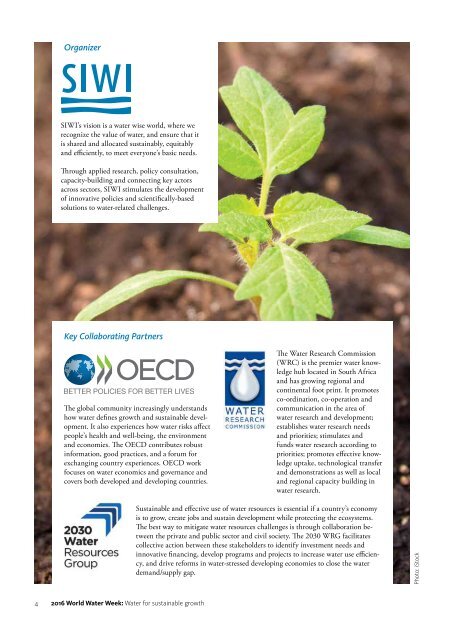2016 World Water Week programme
Create successful ePaper yourself
Turn your PDF publications into a flip-book with our unique Google optimized e-Paper software.
Organizer<br />
SIWI’s vision is a water wise world, where we<br />
recognize the value of water, and ensure that it<br />
is shared and allocated sustainably, equitably<br />
and efficiently, to meet everyone’s basic needs.<br />
Through applied research, policy consultation,<br />
capacity-building and connecting key actors<br />
across sectors, SIWI stimulates the development<br />
of innovative policies and scientifically-based<br />
solutions to water-related challenges.<br />
Key Collaborating Partners<br />
The global community increasingly understands<br />
how water defines growth and sustainable development.<br />
It also experiences how water risks affect<br />
people’s health and well-being, the environment<br />
and economies. The OECD contributes robust<br />
information, good practices, and a forum for<br />
exchanging country experiences. OECD work<br />
focuses on water economics and governance and<br />
covers both developed and developing countries.<br />
The <strong>Water</strong> Research Commission<br />
(WRC) is the premier water knowledge<br />
hub located in South Africa<br />
and has growing regional and<br />
continental foot print. It promotes<br />
co-ordination, co-operation and<br />
communication in the area of<br />
water research and development;<br />
establishes water research needs<br />
and priorities; stimulates and<br />
funds water research according to<br />
priorities; promotes effective knowledge<br />
uptake, technological transfer<br />
and demonstrations as well as local<br />
and regional capacity building in<br />
water research.<br />
Sustainable and effective use of water resources is essential if a country’s economy<br />
is to grow, create jobs and sustain development while protecting the ecosystems.<br />
The best way to mitigate water resources challenges is through collaboration between<br />
the private and public sector and civil society. The 2030 WRG facilitates<br />
collective action between these stakeholders to identify investment needs and<br />
innovative financing, develop programs and projects to increase water use efficiency,<br />
and drive reforms in water-stressed developing economies to close the water<br />
demand/supply gap.<br />
Photo: iStock<br />
4 <strong>2016</strong> <strong>World</strong> <strong>Water</strong> <strong>Week</strong>: <strong>Water</strong> for sustainable growth


















